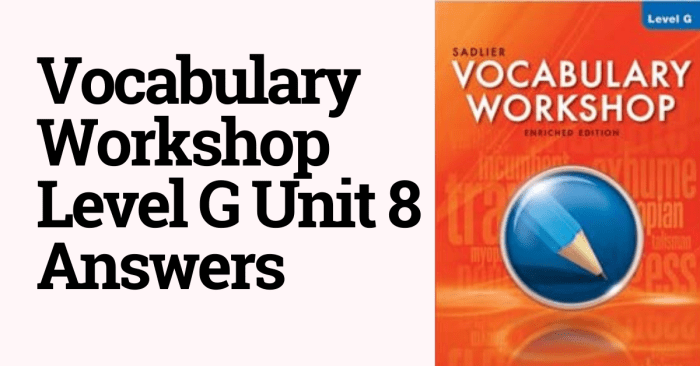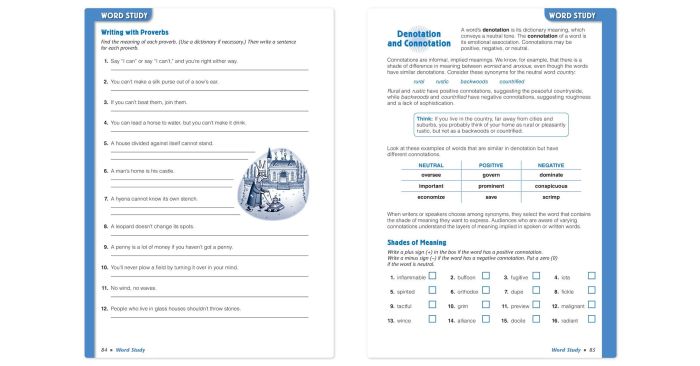Embark on an enriching journey into Vocabulary Unit 8 Level G, where words take center stage. Delve into the intricacies of unfamiliar terms, explore the nuances of multiple meanings, and discover effective strategies to expand your vocabulary. This unit promises to ignite your passion for language and empower you with the tools to communicate with clarity and confidence.
As we navigate through this linguistic adventure, we’ll design vocabulary quizzes to test your understanding, delve into the relationships between words, and uncover the profound impact vocabulary has on our written and spoken communication. Get ready to embark on an exciting exploration of the world of words!
Vocabulary Comprehension

Vocabulary comprehension is essential for effective communication. Expanding your vocabulary allows you to express yourself more precisely, understand others better, and appreciate the nuances of language.
To enhance your vocabulary, engage in reading widely, consult dictionaries, and practice using new words in context. Focus on words that appear frequently or have multiple meanings. By incorporating these strategies into your learning routine, you can significantly improve your vocabulary and enhance your communication skills.
Unfamiliar Words in Context
When encountering unfamiliar words, it’s crucial to consider the context in which they are used. The surrounding words and sentences often provide clues to their meaning. For instance, the word “exacerbate” in the sentence “The heavy rain exacerbated the flooding” suggests that it has something to do with making the situation worse.
This context helps us infer that “exacerbate” means “to worsen” or “to intensify.”
Words with Multiple Meanings
Many words in the English language have multiple meanings. The word “bank,” for example, can refer to a financial institution or the side of a river. To determine the intended meaning, consider the context and the part of speech. In the sentence “I deposited my money in the bank,” “bank” refers to a financial institution, while in “We sat on the bank of the river,” it refers to the river’s edge.
Strategies for Improving Vocabulary
Several strategies can help you improve your vocabulary:
- Read widely:Reading exposes you to a diverse range of words and their usage in context.
- Use a dictionary:When you encounter an unfamiliar word, consult a dictionary to learn its meaning, pronunciation, and usage.
- Practice using new words:Incorporate new words into your conversations, writings, and daily vocabulary. This helps you retain and use them effectively.
- Play word games:Word games like Scrabble, crossword puzzles, and anagrams can help you expand your vocabulary in a fun and engaging way.
- Use flashcards:Create flashcards with new words and their definitions to aid memorization and recall.
Vocabulary Application
Vocabulary application involves putting your knowledge of words into practice. This can be done in various ways, including quizzes, categorization, and topical lists.
Vocabulary quizzes are a great way to test your understanding of new words. They can be multiple choice, fill-in-the-blank, or matching exercises. Quizzes help you identify areas where you need more practice and reinforce the meaning of words you’ve learned.
Creating a Vocabulary Quiz, Vocabulary unit 8 level g
- Choose words that are appropriate for your level and interests.
- Create questions that test different aspects of word knowledge, such as meaning, usage, and pronunciation.
- Provide clear instructions and a time limit to ensure fairness.
- Include an answer key for self-assessment and feedback.
Creating a Word List Related to a Specific Topic
Creating a word list related to a specific topic helps you build vocabulary in a focused way. Choose a topic that you’re interested in or that is relevant to your studies or work.
- Brainstorm words related to the topic and write them down.
- Look up definitions and examples to deepen your understanding.
- Organize the words into categories or s for easy reference.
Organizing Words into Semantic Categories
Organizing words into semantic categories helps you see the relationships between words and their meanings. This can be done by grouping words based on their part of speech, function, or subject matter.
The vocabulary in Unit 8 Level G expands your ability to express yourself, much like the evocative language in Night by Elie Wiesel . With its rich imagery and powerful emotions, this poem captures the horrors of the Holocaust, reminding us of the importance of vocabulary in conveying profound experiences.
As we delve deeper into Unit 8 Level G, we’ll continue to build our linguistic skills to effectively communicate our thoughts and emotions.
- Identify the common characteristics or relationships between words.
- Create categories that are clear and distinct.
- Place words into the appropriate categories.
Vocabulary in Communication

Vocabulary is the foundation of effective communication, both written and spoken. It enables us to express ourselves clearly, precisely, and persuasively. A rich vocabulary allows us to convey complex ideas and emotions with nuance and sophistication.
Word Choice and Meaning
The words we choose have a profound impact on the meaning we convey. Precise word choice can enhance clarity, avoid ambiguity, and create a desired tone or mood. For example, instead of saying “good,” one might use “excellent,” “remarkable,” or “exceptional” to convey a stronger level of positivity.
Vocabulary in Persuasion and Argumentation
Vocabulary plays a crucial role in persuasion and argumentation. By employing persuasive language, we can influence others’ opinions and sway their decisions. For instance, using emotive words can evoke strong emotions, while logical language appeals to reason and intellect. Moreover, employing technical jargon can lend credibility to our arguments.
Vocabulary Development
Expanding your vocabulary is essential for effective communication and critical thinking. Here are some methods to enhance your vocabulary through reading, writing, and listening.
- Reading:Read widely and critically. Engage with different genres, including fiction, non-fiction, and newspapers. Pay attention to unfamiliar words and look them up in a dictionary.
- Writing:Writing encourages you to express your thoughts clearly and precisely. Use a thesaurus to find synonyms and antonyms, expanding your vocabulary range.
- Listening:Active listening exposes you to new words and phrases. Listen attentively to conversations, speeches, and podcasts, noting unfamiliar words and seeking their definitions.
Using a Dictionary and Thesaurus
Dictionaries and thesauruses are invaluable tools for vocabulary development. Dictionaries provide definitions and pronunciations, while thesauruses offer synonyms and antonyms. Using these resources regularly can significantly enhance your word knowledge.
Importance of Context
Context plays a crucial role in vocabulary acquisition. When encountering an unfamiliar word, consider the surrounding text to infer its meaning. This approach helps you understand the word’s usage and nuances.
Vocabulary Enrichment: Vocabulary Unit 8 Level G

Vocabulary enrichment is crucial for expanding your linguistic repertoire and enhancing your communication skills. This section provides strategies to enhance your vocabulary, including creating word tables, developing mind maps, and utilizing resources for further vocabulary development.
Word Tables
Constructing word tables is an effective way to organize and retain vocabulary. Create a table with the following columns: word, definition, part of speech, synonyms, antonyms, and usage examples.
| Word | Definition | Part of Speech | Synonyms | Antonyms | Usage Examples |
|---|---|---|---|---|---|
| Diligent | Showing care and conscientiousness in one’s work or duties | Adjective | Industrious, assiduous | Lazy, indolent | “She was a diligent student who always completed her assignments on time.” |
Mind Maps
Mind maps are visual representations of relationships between words. Start by writing the main vocabulary word in the center of the page. Draw branches from the central word and write related words or concepts on the branches. Continue expanding the mind map by adding more branches and connecting words that share semantic connections.

Resources for Vocabulary Development
- Online dictionaries: Merriam-Webster, Oxford English Dictionary, Cambridge Dictionary
- Thesaurus: Thesaurus.com, Roget’s Thesaurus
- Vocabulary apps: Memrise, Quizlet, Anki
- Books and articles on vocabulary building
- Reading widely: Explore different genres and authors to encounter a diverse range of vocabulary
Questions and Answers
What is the significance of context in vocabulary acquisition?
Context plays a crucial role in vocabulary acquisition as it provides the necessary clues and background information to understand the meaning and usage of words. By examining words within their context, we can grasp their nuances and make meaningful connections, facilitating effective vocabulary learning.
How can I effectively expand my vocabulary?
Expanding your vocabulary requires consistent effort. Engage in regular reading, both fiction and non-fiction, to encounter diverse vocabulary. Utilize a dictionary and thesaurus to explore word meanings and synonyms. Actively listen to podcasts and engage in conversations to absorb new words and their usage.